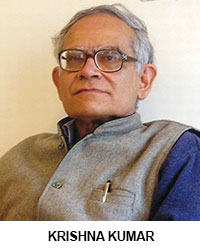Among the great teachers I have trained I remember many who knew how to scold without losing their students’ love and trust. Predictability in a teacher’s behaviour is important, advised the late American educator John Holt

 Dr. Krishna Kumar is former director of NCERT and former professor of education at Delhi University
Dr. Krishna Kumar is former director of NCERT and former professor of education at Delhi University
One of the four teachers I have kept in touch with passed away last month (November) in his late eighties. The others taught me at college or later, but Kapil Dev Tailang was the only one left from my school days. Before he was assigned to my school, he had come in for a few days when the regular teacher was on leave. The difference between the two was stark, and not because the regular teacher was not good.
What made Kapil Dev Sir’s classes an unusual experience was that he did not scold. Decades later, I still find this strange. Some of the boys in my class strived to irritate him, but never succeeded in provoking a reprimand. His style did not include harsh or loud words.
He was a language teacher, and Hindi was his language. He took care not to pollute it in our minds with uncouth usage. His distinction as a teacher shone in moments when he was under stress. He knew how to shame respectfully. In any case, he always used the honorific aap for students while every other teacher addressed us as tum, except teachers who favoured more demeaning variants. For Kapil Dev Sir, the dignity of Hindi, his subject, was a personal value.
Teachers have every right to be harsh at times, but some speak in a reproachful voice all the time. Among the teachers I have trained, I remember many who knew how to scold without losing their students’ trust and love. Predictability in a teacher’s behaviour is important, advised the highly respected American educator John Holt (1923-85) who had deep personal insight into children’s minds and the flaws of America’s school system. One of his most famous books, How Children Fail (1964) could well be re-titled When Teachers Fail. It is not the scolding, but the unpredictability of a teacher’s anger that frightens children and makes them distrustful.
With Kapil Dev Sir, you knew there was no need to feel fearful of him. He was a peace extremist. When boys tried to annoy him, he smiled at them. Most of the time when he was teaching, no one felt like taking advantage of his calm disposition. I recall, when some boys persisted in aggravating him, Kapil Dev Sir left the class, laughing. Long after his retirement, he maintained this capability to laugh at irritants. “My laughter keeps me in good health,” he would say.
His subject had low status in those times, even in a government school. There were no coaching classes in our town, but even then, science and math were regarded as critical to ultimate success, and teachers of these subjects exuded an air of superiority because high marks in these disciplines was the ultimate purpose of learning. Sanskrit was important because you could score math-like marks in it. English was equally important because we were told we wouldn’t get anywhere in life without mastering the language. Hindi had no such perceived advantages to uplift its status as a subject.
Despite this, Kapil Dev Sir became my most memorable teacher because he was pleasant, yet focused. What he taught came alive, and I can still recall many of his classes. Even grammar came alive when he explained a rule by using it in a humorous sentence. When teaching poetry, he asked us to visualise the sentiment, to imagine it. He never attempted to invest relevance or moral meaning into poetry.
The secret of his success as a teacher lay in the pleasure he took in using the language he was supposed to teach in a lucid, transparent manner. Why this was crucial became clear to me years later, when a wonderful professor of English, the late S. Mallikarjunan explained it. He said that language is used best when it does not draw attention to itself. It is like a clean glass window: you don’t feel you are looking through something. That is exactly how Kapil Dev Sir used Hindi, with grace. He wrote on the blackboard in beautiful script, and that too with his left hand. This intrigued his students. Like all good teachers, he was a living mystery. His energy and good health stayed with him to the very end of his long life.
Great teachers are life changers. Kapil Dev Sir asked me to send a short composition I had written as class work, to a magazine which had a section for children. For a year or so, I didn’t know my contribution had been published. After I discovered this, my association with the magazine grew. The relationship introduced me to a bigger world — of editors, writers, and publishers. Engaging with that world was years away, but it became part of reality at school. Kapil Dev Sir showed me where the doors and clear windows were.
Also read: Corona in the curriculum

Remembrance of an ideal teacher
Among the great teachers I have trained I remember many who knew how to scold without losing their students’ love and trust. Predictability in a teacher’s behaviour is important, advised the late American educator John Holt
One of the four teachers I have kept in touch with passed away last month (November) in his late eighties. The others taught me at college or later, but Kapil Dev Tailang was the only one left from my school days. Before he was assigned to my school, he had come in for a few days when the regular teacher was on leave. The difference between the two was stark, and not because the regular teacher was not good.
What made Kapil Dev Sir’s classes an unusual experience was that he did not scold. Decades later, I still find this strange. Some of the boys in my class strived to irritate him, but never succeeded in provoking a reprimand. His style did not include harsh or loud words.
He was a language teacher, and Hindi was his language. He took care not to pollute it in our minds with uncouth usage. His distinction as a teacher shone in moments when he was under stress. He knew how to shame respectfully. In any case, he always used the honorific aap for students while every other teacher addressed us as tum, except teachers who favoured more demeaning variants. For Kapil Dev Sir, the dignity of Hindi, his subject, was a personal value.
Teachers have every right to be harsh at times, but some speak in a reproachful voice all the time. Among the teachers I have trained, I remember many who knew how to scold without losing their students’ trust and love. Predictability in a teacher’s behaviour is important, advised the highly respected American educator John Holt (1923-85) who had deep personal insight into children’s minds and the flaws of America’s school system. One of his most famous books, How Children Fail (1964) could well be re-titled When Teachers Fail. It is not the scolding, but the unpredictability of a teacher’s anger that frightens children and makes them distrustful.
With Kapil Dev Sir, you knew there was no need to feel fearful of him. He was a peace extremist. When boys tried to annoy him, he smiled at them. Most of the time when he was teaching, no one felt like taking advantage of his calm disposition. I recall, when some boys persisted in aggravating him, Kapil Dev Sir left the class, laughing. Long after his retirement, he maintained this capability to laugh at irritants. “My laughter keeps me in good health,” he would say.
His subject had low status in those times, even in a government school. There were no coaching classes in our town, but even then, science and math were regarded as critical to ultimate success, and teachers of these subjects exuded an air of superiority because high marks in these disciplines was the ultimate purpose of learning. Sanskrit was important because you could score math-like marks in it. English was equally important because we were told we wouldn’t get anywhere in life without mastering the language. Hindi had no such perceived advantages to uplift its status as a subject.
Despite this, Kapil Dev Sir became my most memorable teacher because he was pleasant, yet focused. What he taught came alive, and I can still recall many of his classes. Even grammar came alive when he explained a rule by using it in a humorous sentence. When teaching poetry, he asked us to visualise the sentiment, to imagine it. He never attempted to invest relevance or moral meaning into poetry.
The secret of his success as a teacher lay in the pleasure he took in using the language he was supposed to teach in a lucid, transparent manner. Why this was crucial became clear to me years later, when a wonderful professor of English, the late S. Mallikarjunan explained it. He said that language is used best when it does not draw attention to itself. It is like a clean glass window: you don’t feel you are looking through something. That is exactly how Kapil Dev Sir used Hindi, with grace. He wrote on the blackboard in beautiful script, and that too with his left hand. This intrigued his students. Like all good teachers, he was a living mystery. His energy and good health stayed with him to the very end of his long life.
Great teachers are life changers. Kapil Dev Sir asked me to send a short composition I had written as class work, to a magazine which had a section for children. For a year or so, I didn’t know my contribution had been published. After I discovered this, my association with the magazine grew. The relationship introduced me to a bigger world — of editors, writers, and publishers. Engaging with that world was years away, but it became part of reality at school. Kapil Dev Sir showed me where the doors and clear windows were.
Also read: Corona in the curriculum